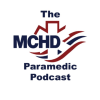Starting in late 2015, MCHD began a regional quality improvement project in Southeast Texas to improve coordination of stroke care between EMS and our hospital partners. This effort has been a successful collaboration that started when the clinical team at MCHD engaged regional stakeholders to improve times to revascularization therapy in large vessel occlusion stroke.
Earlier in 2015, five landmark trials were published that demonstrated improved patient outcomes in large vessel occlusion (LVO) stroke when patients underwent clot removal with endovascular therapy.
This procedure demonstrates improved neurologic outcomes in patients with ischemic LVO stroke up to 24 hours after last known well.
For patients, this represents one of the most promising therapies since tPA (the clot busting drug) was introduced over 20 years ago.
For EMS systems, this new therapy presented some unique challenges. The therapy is very time-sensitive and delays in diagnosis or definitive revascularization therapy result in a diminished chance for favorable neurologic outcome. This challenge is a game changer for EMS as now our question is not “stroke yes/no,” but “stroke yes/no,” plus “how bad?”
We are now tasked with making the diagnosis of stroke, ruling out the mimics, using a severity scale to assess the risk for LVO and, then, determining the patient’s disposition to comprehensive stroke centers capable of thrombectomy.
MCHD, along with our regional healthcare systems, developed a novel stroke assessment endovascular pathway that we paired with specialized training in the prehospital diagnostic stroke screening tools to assess for LVO (see the video below).
The MCHD Paramedic Podcast released an initial stroke education episode for LVO in 2018 (see episode 9 below), and we’ve followed up with a panel of regional experts this month to update everyone on the latest in endovascular clot retrieval for LVO stroke (see episode 56 below).
The outcome of this effort by our clinical team and regional partners has been phenomenal. We’ve seen times to reperfusion therapy cut in half. The average time from EMS arrival to groin puncture for our comprehensive stroke centers is now consistently less than 90 minutes.
MCHD monitors these important quality indicators with an automated performance feedback system developed by our business analysis unit and clinical team. The process allows for virtually real-time feedback on regional performance.
Stakeholders meet on a regular basis at a vascular case conference hosted by MCHD. This collaboration brings EMS along with our neurology and neurosurgical partners into the same room to discuss shared cases in an effort to continue the search for new innovations to improve our care of stroke patients in Southeast Texas.
The state of EMS stroke care
Stroke systems of care
Stroke Updates: The Montgomery County Experience
LVO Stroke Training
MCHD thanks these contributors:
Yazan J Alderazi, MD, is assistant professor, Department of Neurology, University of Texas at Houston Health Science Center; clinical director, Neuro-Endovascular at Memorial Hermann The Woodlands; and clinical director, Neuro-critical care at Memorial Hermann The Woodlands.
Jeremiah Johnson, M.D., FAANS, is a board-certified cerebrovascular neurosurgeon who underwent training at University of Miami and Stanford University, respectively. Currently, he holds the title of assistant professor in the Department of Neurosurgery at Baylor College of Medicine (BCM) and Baylor St. Luke’s Medical Group, and is the director of Stroke and Neurovascular care at St. Luke’s The Woodlands Hospital. Additionally, he is currently chair of the Young Neurosurgeon’s Committee at the American Association of Neurological Surgeons and the co-director of the BCM Neuro Innovation Laboratory.
Abhi Agrawal, MD, is a leading neuro-interventional surgeon and is the medical director of the Neuro-Interventional Radiology Implementation Program at Houston Methodist The Woodlands Hospital. He is fellowship-trained in endovascular neurosurgery and neuro-interventional radiology.
Dr. Agrawal has served as an editor for five neurosurgery textbooks, as well as an associate editor of the Asian Journal of Neurosurgery. He is an editorial board member and reviewer of multiple national and international neurosurgery journals and has published more than 60 articles in peer-reviewed neurosurgery journals. In addition to receiving multiple awards and grants in professional conferences and meetings, Dr. Agrawal also served as the past-president of the Asian Young Neurosurgeons Society.
Sabih Effendi, MD, grew up in The Woodlands and attended Oak Ridge High School. He graduated at the top of his class from the University of Texas Southwestern Medical Center in 2010. He completed his neurological surgery residency program at Baylor College of Medicine and MD Anderson Cancer Center where he received the Kinjiro Iwata Award for Excellence and Leadership.
Dr. Effendi is fellowship trained in cerebrovascular and endovascular neurosurgery and cortical/subcortical brain mapping and he has extensive clinical expertise in minimally invasive cranial, skull base, spinal and peripheral nerve surgery.
MCHD would also like to acknowledge our regional partners:
- Southeast Texas Regional Advisor Council (SETRAC) Stroke and EMS committees
- Houston Methodist the Woodlands - Dr. Agarwal and Dr. Effendi
- Memorial Herman the Woodlands - Dr. Alderazi
- St Luke’s the Woodlands - Dr. Johnson
- HCA Houston Healthcare
















